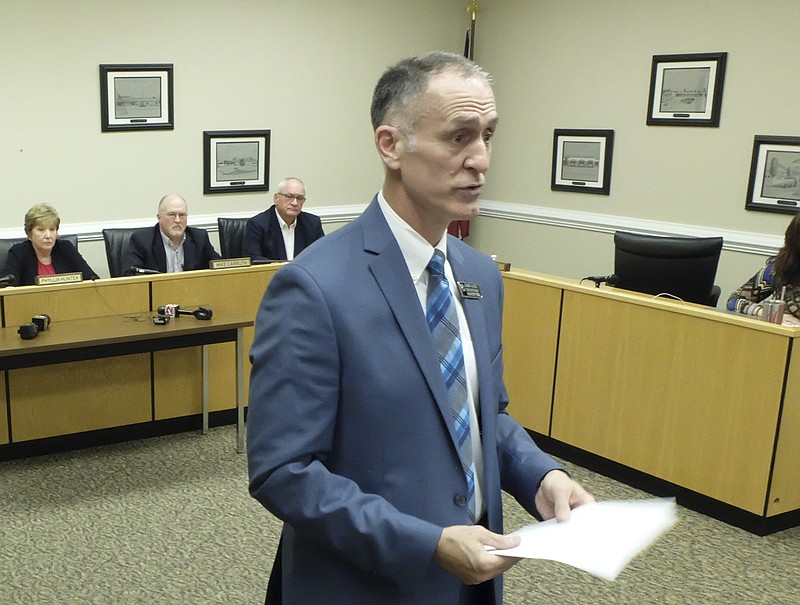CHICKAMAUGA, Ga. - Even with more money coming in this year, Walker County Schools teachers will see a big cut in funding for instruction supplies.
According to the proposed budget, which the Board of Education will vote on Monday, the district will spend about $500,000 on instructional allotments this year. That is down from $817,000 budgeted in Fiscal Year 2018, a 39 percent cut.
Allotments are funded from the state through the Quality Basic Education formula. Of the total amount of state funding, a certain percentage is supposed to be used on allotments, which can go toward school projects or classroom supplies. Walker County Director of Financial Services Bridgette Watts said the exact amount of money every year is based on a school's number of students, as well as how many students are in certain categories, such as special education.
But for several years, Watts said, the schools did not spend the total amount given to them from the state. Finally, last year, Superintendent Damon Raines instructed the schools to spend it all - including the leftover money from years past.
"It's best to encourage them not to hold that over because the kids in there that year deserve that money spent on them," said Watts, who took over as director of financial services last fall.
Why didn't they spend the full amount they were given before? For at least the last six years, Raines said administrators wanted to save the money given to them from the state. They wouldn't give anything to the schools from the allotments in the first semester, so they could evaluate where their fiscal year budget went.
Then, he said, "we gave them some of it back in smaller increments to spend."
"Once we got back to where the budget was in pretty good shape, it was just easier to say, 'OK, we're budgeting this,'" Raines told the Times Free Press. "That doesn't mean you have a blank check to go out and start spending. Because they've been trained really well to watch what they're doing. We just decided it was easier to make the budget look cleaner to do it that way."
After a budget hearing Tuesday evening, he echoed the concern that Watts expressed: That money was coming in for students, but the district was not spending it on those students. If the district saved some of that allotment money for three or four years, some students may be gone before the school uses it.
This led to a large boost in spending last fiscal year, Watts explained. Now, funding is back down.
Raines said he wasn't sure exactly how long this practice was going on. He and Watts also did not have past budgets in front of them at Tuesday's meeting, so they didn't know how much was budgeted for instructional allotments going back further than last year. (When asked about it, Raines said he would provide those figures at a later date.)
There is another big cut in instructional operating expenses under the line item "learning resources," which is dropping in the new budget from $440,000 to $240,000. Watts said most of the cut can be explained by the fact the district saved for several years to purchase the Reading Wonders program for all third- through fifth-graders.
The district finally made that purchase last year. So this year, she said, they didn't need to budget as much. (She and Raines did not have past budgets that would show how much the district spent on "learning resources" going beyond last year. The budgets the school system files online with the Carl Vinson Institute of Government are not detailed enough to show that, either.)
Overall, revenue is increasing this year by $1.6 million, a 2 percent increase driven mostly from more state funding. Spending is also going up by about $2.5 million, a 2.8 percent increase.
Of the spending increases, most is going toward employer contributions to the Teacher Retirement System of Georgia. The pension system's board voted last year to increase the local district's contribution rates. That resulted in Walker County Schools paying about $2 million more this year.
During Tuesday's meeting, Raines told the board to pay attention to pension debates in the state legislature next year. He said the state budgeted about $300 million toward the retirement plans last year, and some lawmakers want change. That came up over the weekend when Raines attended a conference where Gov. Nathan Deal spoke.
"They encouraged us, as superintendents, to begin to develop a battle plan for what we're going to do in the future," he said. "The legislature is not happy having to fund those increases every year."
The board will hold another public meeting on its budget at 5 p.m. Monday at 201 S. Duke St. in LaFayette. It will then vote on the budget during its 6 p.m. meeting that day.
Contact staff writer Tyler Jett at 423-757-6476 or tjett@timesfreepress.com. Follow him on Twitter @LetsJett.
